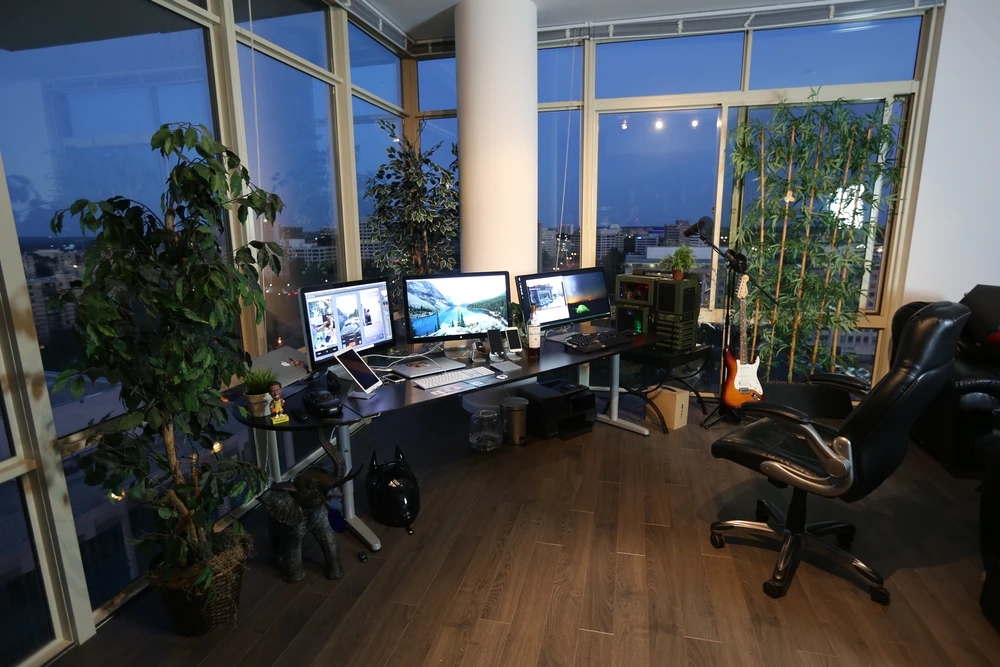The office is a relic of the past
By now most businesses and other organizations will have woken up to a, for many of them, new reality. The reality that the office is a relic of the past. Not completely and in all situations, but for many people, use cases and industries. The writing has been on the wall for quite a while, that is for sure. But now it is being driven home remorselessly. Corona and Covid-19 are just messengers.
If you make your living selling office spaces this is bad news and you are likely to disagree with a vengeance. Join the club of transport and other companies. Change can hurt when you are at the receiving end. Relics or not, offices still have their use, but their dominance is over and it has been for a while.
Corona & Covid-19
At the time of writing, it’s been about 6 months since, all over the globe, we went to a “work from home as much as possible” approach. This in order to deal with the impact of Corona and Covid-19. While we are all telecommuting, our businesses are still running and they function just fine. Better than if we would require everyone to be in harm’s way during a global pandemic, That should make everyone think.
Some say this is only possible due to technical advances in the past 5 years. I think they mean Teams and Zoom. But in reality, it has been possible for well over a decade. At least where I had a say in the infrastructure.

Working from home has its challenges for sure. Things can be better technically for some of us. But hey considering this was all done under the pressure of Covid-19 and despite some managers, it’s not too bad. For many, the home office can use a second screen and or better chair. People with kids, who are caretakers of elderly dependents, etc. will have some extra challenges. Quite often the home office could also with a makeover and some improvements to handle hot or cold weather better and to make permanent telecommuting more comfortable.

The mere fact that some work at the dinner table demonstrates the need for a home office in the first place. Blame short term thinking and acting as if nothing ever changes for this when it comes to housing and public domain planning. But all that does not distract from the fact that businesses keep running during the pandemic. As a matter of fact, they are running well.
Business as usual
Many of my buddies in IT and I have been working from home part-time or full time for well over a decade. We did not miss a beat. Bar the pandemic specific unpleasantries it was almost business as usual for us. Lucky we.
My home office and lab is very well equipped. At my own expense. I value telecommuting and it shows. Actually, the topic comes up every now and then amongst us to just pack up and live wherever you want while working. Life is short and it might be over before you ever retire. So make the most of it.

The one thing to avoid is that working from home turns into living at work. That’s when you have lost balance. However, that is no excuse to haul half of the population back and forth to offices every day.
Business is about money
As businesses and other organizations come to terms with that new reality they also have to face another fact. The fact that the total cost to keep someone at a desk in a building (rent, power, heating, security, insurance, regulations, catering, …) is high. In many cases too high. And as the workforce has been working from home for almost 6 months now they should be questioning why and to what purpose that money is spent.
If you excel at dynamic operational management you should already be making plans and reducing your costs by reducing office space, if not downright abandoning it. Even if organizations need to spend 150$ or more per month per employee on home office expenses they will still come out ahead. And not just the businesses, also society as a whole as well as the individuals involved. The tools, the technology we need exists and are only getting better. Regulations might need to catch up, but again, that is no reason to keep offices around.
Win-Win?
While some employees struggle with 100% telecommuting, especially combined with the stress induced by a global pandemic, many have woken up to the many benefits as well. They realize they can reduce commuting costs (gas, public transport), dry cleaning, work attire, commute time, etc… Next to that, they, if are not too challenged by the pandemic’s extra burdens, might very well notice they can get their work one more productively and undisturbed compared to when in the office merry go around. This can lead to a better work-life balance and time regained.
More than ever before, people will demand to work from home. Governments and business planning for the next crisis will want this to succeed as well to soften the impact and smoothen the experience of a pandemic or other disaster. All that while saving money and reducing congestion. What’s not to like? The number of work from home job adds has risen with 300%. Smart businesses are leveraging work from home to attract top talent. Others are losing talent over it. Think about that.
Make no mistake, the moment you become more productive businesses will try and recuperate that time for their own profit and out need. No need to be naïve here. The race to stay competitive will push them to do so, that, along with greed. Let’s face it, most innovations that offer benefits to the average person soon become revenue or cost avoidance streams for others. Look at solar panels and smart meters. Right now they are being used to protect revenue streams of providers and favor higher consumption. By the same reasoning, we might have to pay for the empty office buildings. The risk of an entrepreneur is often socialized while the profits are private. In those cases, you don’t hear them complain about entitlement.
Time for managers to lead by example
Managers will have to step up. They need to learn how to really hire and lead talented people. That is a different ball game than just collecting employees into open office spaces and having them run around to meetings all day long. It is as if the entire technical evolution of the past 25 years has passed management by when you see how often this is still the reality for many of us. So maybe it is not just offices that are a relic of the past.
Let’s get the obvious remark about jobs that require a physical presence off the table. Yes, they exist, there are many of those. Those people can also benefit from the mere fact that the rest of us are not moving around like zombies every morning and evening without any good reason. Especially since working at an office has at best very little, likely no positive and quite possibly a negative impact on getting the job done.
Backpressure is inevitable
The incumbents, comfortable in the predictability of the status quo, will always challenge change. They only like change when others “that are stuck in their ways” have to deal with it or when it benefits them significantly. In any other situation, they will fake change when required, but that’s about it.
When you are in the business of facility management the idea that the office is a relic of the past will cause some disconcert. No matter how you translate or communicate that message, the consequence is that the facility business is about to shrink significantly. And with that comes the loss of power, money, and prestige.
Reducing or abandoning offices all to getter happens for good reasons, actually. Office space is very expensive and not that efficient let alone effective as many assume. Offices tend to lead to wasted time, groupthink and can be distractive to the point it diminishes productivity.

Many will be tempted to fill those offices again as soon as possible. Why? Because they own real estate or have investments in sales and leaseback or even pure long term leases. They’d rather throw good money after sunk costs to avoid looking like they should have rethought the entire office n the 21st-century thing a bit earlier. A few decades earlier even. But instead, they have been running after the “latest” office fashions like cubicles, open office plans. Often a decade too late, when the fad had been debunked a 100th times already. All this while technological progress was showing us all the way forward.
You will see lobbying and fear mongering to get people back into offices and some politicians will fall for it. But work and offices are no longer as connected as they use to be. As long as the money flows into their pockets they will not call something a waste. Despite the costs to others and the environment.
I am an IT professional who is active in the global community. The majority of interactions and collaboration happens online, across time zones even. We work, learn, collaborate remotely together. Consequently I can only shake my head at so much institutionalized inertia.
Offices were devised many centuries ago out of necessity
Offices were devised in an era that administration and bureaucracy and complexity with global operations were growing. Meeting the needs to address all that required the office to be invented. Read https://www.bbc.com/news/magazine-23372401. Even back then many employees experienced unhappy and unsatisfied excuses for “careers” in those offices. So yes offices can go away or be reduced significantly. That is okay. The same happened with cowboy bunkhouses, factory housing, horse and carriage as well as steam engines, and now even combustion engines.
The need for offices has diminished significantly by now. Many are remnants of a bygone era. When not strictly needed, they exist to keep a market alive and prevent real change hat would upset the powers that be. Blame, or rather thank information technology.
Some offices are needed, many are not
I am sure offices will be adapted to be more corona (pandemic) proof, and while needed, it does not make office life more enjoyable. People will be hesitant to return to dense landscape offices and overcrowded meeting rooms that are used by another bunch of people every hour or half-hour. The commute, the distractions, the cost will all be balanced against the benefits. Offices will lose that comparison. Sure when people really need a job, they might put up with having to go to an office, but that is not a choice. Given a choice, well over half of the employees will prefer to telecommute at least part-time.

If a job requires you to be in an office and you cannot find candidates it means that what you offer is just not good enough and the need to be there is not very convincing. Why would I put up with landscape offices that cause me stress, reduce my productivity as they kill my ability to concentrate? On top of this, to add insult to injury it makes lose time in stressful commutes, money on travel, etc. To make it even worse it wrecks my ability to balance that with the needs of children or elderly under my care and makes shopping race against the clock.
Commuting adds to traffic congestion, pollution, and stress. So when the jobs are equal, as most are, with only a minor variance in pay, why would I choose a job that imposes all that on me over one that doesn’t? What is in it for me and your company? Catering to failed leadership in the face of clear and present alternatives?

I will no take jobs that require my presence in the office full time unless I absolutely had to. So while many complain about not finding talent and secretly hope a bit more unemployment would make finding candidates easier maybe they should address their own issues.
Forcing people back to the office
Why would you want to do that? Because you have the office and want an excuse for the expense? It won’t make for happy employees. You don’t care? Well, that tells employees all they need to know about you. They will resent you for it and will disengage or disconnect. They might stay but you might have destroyed any engagement they had left with the organization.
Many people I know will not ever again take a job that forces them back into the office every day. Not if they have a say in it and the circumstances allow for it. And even when you get that talent back into the office for some reason, they will leave as soon as they can. Any illusion of employee retention will be out of the window. Even when they stay, when they have no other choice, they will be less engaged. Force and threats are ill-advised management techniques. It won’t help you in the long run.
But people need supervision
Do you think they need supervision? Maybe if you are a kindergarten teacher. If that is not the case, did you hire the correct people? Do you really think they need that to be more productive?
Modern offices are often not about productivity but about cost optimization. Landscape offices and other nonsense have destroyed more productivity and killed more interpersonal collaboration that it ever created. they exist to reduce costs while catering to lazy and easy management. Make sure everyone is at their desk or in a meeting room. Attendance qualifies as output, maybe even as an outcome. Horrible! Presentism is dead. It was and has always been a retarded business practice.
Keep offices where and when they make sense. Be bold and brave when it comes to moving away from them in other cases. Position yourself for the best possible outcome for your workforce and your business. Also, don’t forget that offices tend to be in cities. Cities are costly places to live and real estate is small and expensive. Being there and working from home during a pandemic is not all that fun. Especially since all the benefits of a city are missing with pandemic measures in place. I know many have dreams of ideal cities that have wonderful living conditions for everyone but which should help us cope with energy consumption, loss of open space, and reduce global warming. But you cannot live in dreams. Cities also don’t address the real issue of too many people on too small a planet that has become a village.
But people are social animals
Yes, and they can have more time to socialize at lower stress levels when telecommuting. They can work and collaborate with colleagues within and outside of the company in a coffee shop or meetup space once in a while. The professional development is often limited by corporate office borders. There is so much to learn from collaborating with others.

They can attend conferences and community events, they can make it to user groups on time since they don’t commute as often, … there are so many other opportunities to socialize and be productive outside of the office. I would not be the professional I am today if I had stuck to the office as a place to socialize, work, and learn.
Really, we can keep going. But I see a lot more excuses than I do genuine reasons trying to dispel that the office is a relic of the past.
Use the pandemic as a learning opportunity
No, I am not just talking about self-study in some of the time freed up by not having to commute.
If you are only interested in maintaining the status quo in order to avoid losing power and budgets you are delaying the inevitable while costing your company dearly. You are throwing good money away whilst missing opportunities and losing talent. The latter both in recruitment as well as in turn over. Many companies will make that mistake. Governments as well. I can already notice the discussions about the financial impact on public travel and the need to get commuters on board again. Despite congestion, pollution, time lost … all to keep an old economic reality going.
Last but not least you are proving yourself a hypocrite. Harsh, but true. All the babbling about “the only constant is change” to your employee over the past decade goes out of the window the moment it disrupts your comfort zone and challenges you to reinvent your self.

Really reinvent yourself. You can no longer pretend change is moving from Skype to Teams, from VPN to VDI, or from PIN to contactless payments. Those are technical evolutions. Just like a new office building might be more energy-efficient or comfortable it is not a huge change over the older one. Changing how you do business, organize your workspace and workforce will require a real effort and change, also from you.
The fact that some managers need to physically have their employees in an office and meeting rooms is worrisome. It is very limiting and comes at a high cost. Sure actual problem is not the manager? It takes real skills to keep people moving in the right way effectively and efficiently. Office spaces are just one piece of a sideshow prohibiting real progress. It reminds me of measuring output instead of outcomes. Honestly, the office is just one more example of the many blunt instruments in our professional lives that stand little chance of making a real difference.
Conclusion
To conclude, is my statement that the office is a relic of the past correct? Well yes. Not for the full one-hundred percent of use cases but office space can be reduced significantly and the remainder can be leveraged in a modern, flexible way to your advantage.
Managers, get out of your comfort zone. Wake up and smell the coffee. Surely, you are not going to wait for the next pandemic to close the office for you, and for good at that time, are you? The office is a relic of the past, in many aspects. If you want to save it for what it is good for, you’ll need to get rid of the rest.
Disagree all you want but at least think and discuss this beyond the comfort of a status quo and routine. Think.





